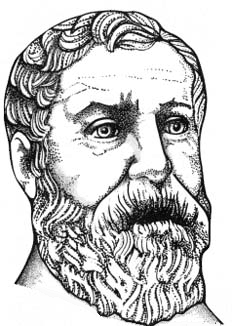亞歷山卓的海龍
古希腊数学家、工程师 来自维基百科,自由的百科全书
亞歷山卓的海龍(希臘語:Ἥρων ὁ Ἀλεξανδρεύς)(公元10年—70年) ,是一位古希臘數學家,居住於羅馬帝國治下的埃及。他也是一名活躍於家鄉亞歷山卓港的工程師,被認為是古代最偉大的實驗家[1],其著作於希臘化時代科學傳統方面享負盛名。[2]
海龍發明了一種叫汽轉球的蒸汽機。在他這麼多種發明之中,最著名的是風輪,這發明是其中一種最早利用風能的設備。一般認為他也是一位原子論者,他的一些思想乃源自克特西比烏斯(Ctesibius)的著作。
背景
由於海龍的作品深受巴比倫文化的影響,所以他曾被少數學者認為他是一位帶有埃及或腓尼基血統的希臘人。[3]但現代學者卻認為他是一位純希臘人。[4][1][5]數學歷史學家卡爾·本雅明·博耶(C. B. Boyer)解釋,海龍之所以被認為是埃及人或腓尼基人,是因為他的作品帶有濃烈的巴比倫色彩。但是最少自亞歷山大大帝時期起至古典時代(Classical antiquity)結束的一段時期,希臘的確與美索不達米亞有許多來往,而且不難看到巴比倫的算術和代數幾何學一直對希臘化文明產生重大影響。[4]
事蹟
由於海龍大部份的作品(包括數學、力學、物理和氣體力學)都以講稿的形式出現,所以他被認為曾在繆斯之家教學(包括亞歷山卓圖書館)。此外,雖然這些學術領域在二十世紀之前尚未正式化,但他的發明為模控學的研究資料。[6]海龍發明了許多設備,例如:汽轉球、自動售賣機、注射器、蒸氣風琴等。
發明

數學成就
海龍發明了一種用於反覆計算平方根的方法,[7] 叫做Babylonian method。這公式以Babylonian命名,是因為巴比倫人比海龍早知道這種計算法。現今人們比較熟悉海龍發明的海龍公式,這公式是以三角形的邊長來計算三角形的面積。
參考文獻
Wikiwand - on
Seamless Wikipedia browsing. On steroids.

